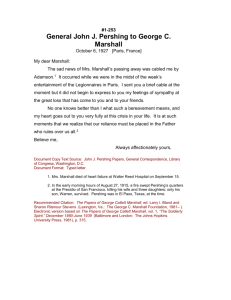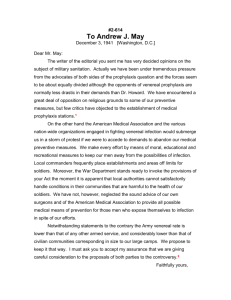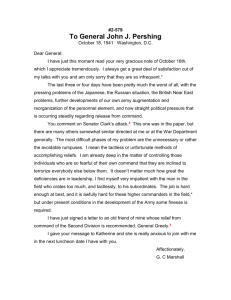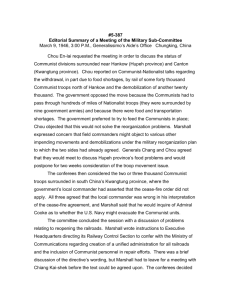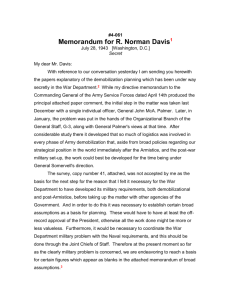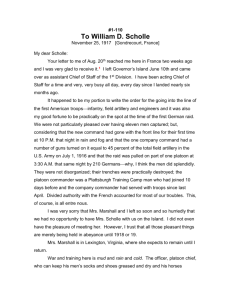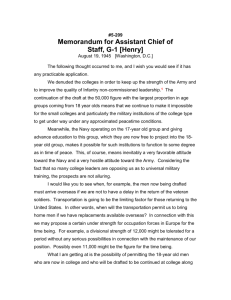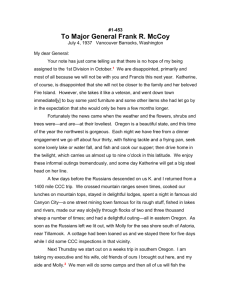2-127 - George C. Marshall Foundation
advertisement
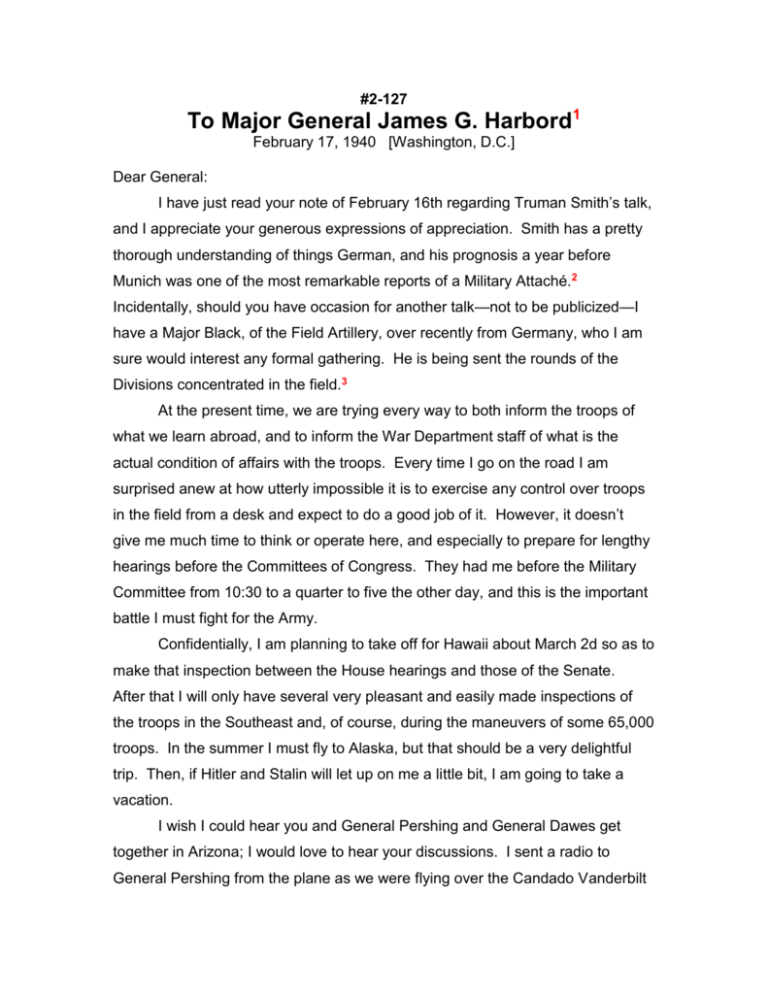
#2-127 To Major General James G. Harbord1 February 17, 1940 [Washington, D.C.] Dear General: I have just read your note of February 16th regarding Truman Smith’s talk, and I appreciate your generous expressions of appreciation. Smith has a pretty thorough understanding of things German, and his prognosis a year before Munich was one of the most remarkable reports of a Military Attaché.2 Incidentally, should you have occasion for another talk—not to be publicized—I have a Major Black, of the Field Artillery, over recently from Germany, who I am sure would interest any formal gathering. He is being sent the rounds of the Divisions concentrated in the field.3 At the present time, we are trying every way to both inform the troops of what we learn abroad, and to inform the War Department staff of what is the actual condition of affairs with the troops. Every time I go on the road I am surprised anew at how utterly impossible it is to exercise any control over troops in the field from a desk and expect to do a good job of it. However, it doesn’t give me much time to think or operate here, and especially to prepare for lengthy hearings before the Committees of Congress. They had me before the Military Committee from 10:30 to a quarter to five the other day, and this is the important battle I must fight for the Army. Confidentially, I am planning to take off for Hawaii about March 2d so as to make that inspection between the House hearings and those of the Senate. After that I will only have several very pleasant and easily made inspections of the troops in the Southeast and, of course, during the maneuvers of some 65,000 troops. In the summer I must fly to Alaska, but that should be a very delightful trip. Then, if Hitler and Stalin will let up on me a little bit, I am going to take a vacation. I wish I could hear you and General Pershing and General Dawes get together in Arizona; I would love to hear your discussions. I sent a radio to General Pershing from the plane as we were flying over the Candado Vanderbilt Hotel beach, where the General and I played around for a week following a shipwreck in 1920. The message went direct from the plane to the Army operator of the Tucson air field, and within five minutes I got a report back that Miss May Pershing had received the message.4 Mrs. Marshall was at Miami Beach and is now at Key West. She plans to return the end of the month, but I want her to stay until after I get back from Hawaii. With affectionate regards to you and Anne, Faithfully yours, Document Copy Text Source: George C. Marshall Papers, Pentagon Office Collection, Selected Materials, George C. Marshall Research Library, Lexington, Virginia. Document Format: Typed letter. 1. Harbord had been Pershing’s chief of staff in France and later deputy chief of staff of the army. 2. Lieutenant Colonel Truman Smith had been military attaché in Berlin in the 1920s and again between August 1935 and April 1939. Since August 1939 he had been in the G2 section of the General Staff. (For Smith’s observations on Germany, see Berlin Alert: The Memoirs and Reports of Truman Smith, ed. Robert Hessen [Stanford, Calif.: Hoover Institution Press, 1984].) Smith was also a good friend of Charles A. Lindbergh, who noted in his diary of July 25, 1939: “I found that Marshall had a very high regard for Smith.” (The Wartime Journals of Charles A. Lindbergh [New York: Harcourt Brace Jovanovich, 1970], p. 235. See also Papers of George Catlett Marshall, #1-392 [1: 479], #1-396 [1: 482–84], and #1-535 [1: 670].) In his February 6 letter, Harbord asked for Smith to speak at the Second Division dinner in New York City. Smith “delivered a most excellent talk on the Polish Campaign. He was kind enough to submit himself to questions afterward and the questions were about what you would expect from sixty former officers more than twenty years out of service, but he handled himself very well and a good many of the questions were not foolish.” (Harbord to Marshall, February 16, 1940, GCMRL/G.C. Marshall Papers [Pentagon Office, Selected].) 3. Concerning Percy G. Black, see Marshall to Chaffee, December 20, 1939, Papers of George Catlett Marshall, #2-091 [2: 120]. 4. General and Mrs. Harbord vacationed with General Pershing and Brigadier General and Mrs. Charles G. Dawes in Tucson, Arizona; Guaymas, Mexico; and Rancho Santa Fe, California. The “shipwreck” to which Marshall refers occurred on May 10, 1920, when the U.S.A.T. Northern Pacific ran aground while leaving San Juan, Puerto Rico. (See Papers of George Catlett Marshall, #1-241 [1: 286, 293].) May was General Pershing’s sister. Recommended Citation: The Papers of George Catlett Marshall, ed. Larry I. Bland, Sharon Ritenour Stevens, and Clarence E. Wunderlin, Jr. (Lexington, Va.: The George C. Marshall Foundation, 1981– ). Electronic version based on The Papers of George Catlett Marshall, vol. 2, “We Cannot Delay,” July 1, 1939-December 6, 1941 (Baltimore and London: The Johns Hopkins University Press, 1986), pp. 161–162.
